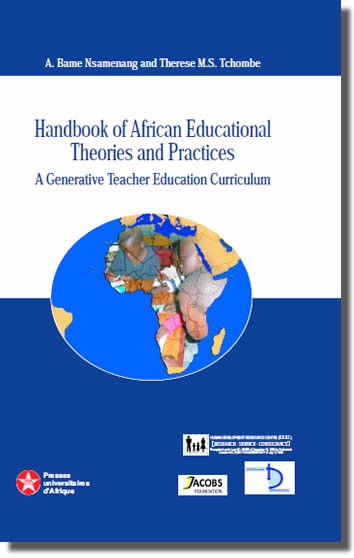Littérature / édition

éDUCATION, ENSEIGNEMENT | Janvier 2012
Handbook of African Educational Theories and Practices: A Generative Teacher Education Curriculum

Pays concerné : Cameroun
Edition : Presses Universitaires d’Afrique / Africaine d’Édition et de Services (PUA / AES)
Pays d’édition : Cameroun
ISBN : 978-9956-444-64-2
Dewey : Sciences sociales
Pages: 564
Prix : 42.00
Parution : 01 Janvier 2012
Français
A. Bame Nsamenang, Therese M.S. Tchombe
This Handbook is a beginning, albeit an imperfect one. We have dared to begin expecting that reflection, critical feedback; research and field use of the handbook will lead to an improved second edition. If we continue to wait to feel faultless, we might never begin. So, bear with us for the shortcomings and gaps in this faultful but landmark first step.
We believe that the value of the school as a social institution is its role in connecting the school to its host community. Our work as researchers and African teacher educators who increasingly face the challenge to make our scholarship relevant jilted us into noticing a mismatch between the African school, beginning with early group care and education of children in Western institutional models, and the livelihoods of Africa’s young citizens. We have since become aware that education curricula in Africa seldom take into explicit account its grounded subject-matter – the theories and concepts with which the beneficiaries of education see their cultural world and their ways of thinking and engaging with the world. We also discerned lack of concerted continental effort, beyond longstanding rhetoric by Africa’s leadership and education partners, to contextualize education curricula by premising curricular contents on the African environment, child development, cultural heritage, and the demands of technological advances and economic development. We have learned that no people entirely dislodged from their ancestral roots have ever made collective progress with development and that the era of outsiders deciding and « supplying » what Africans need has not yielded hoped-for outcomes.
[La fiche de l’ouvrage sur le site des Presses Universitaires d’Afrique]
This Handbook is a beginning, albeit an imperfect one. We have dared to begin expecting that reflection, critical feedback; research and field use of the handbook will lead to an improved second edition. If we continue to wait to feel faultless, we might never begin. So, bear with us for the shortcomings and gaps in this faultful but landmark first step.
We believe that the value of the school as a social institution is its role in connecting the school to its host community. Our work as researchers and African teacher educators who increasingly face the challenge to make our scholarship relevant jilted us into noticing a mismatch between the African school, beginning with early group care and education of children in Western institutional models, and the livelihoods of Africa’s young citizens. We have since become aware that education curricula in Africa seldom take into explicit account its grounded subject-matter – the theories and concepts with which the beneficiaries of education see their cultural world and their ways of thinking and engaging with the world. We also discerned lack of concerted continental effort, beyond longstanding rhetoric by Africa’s leadership and education partners, to contextualize education curricula by premising curricular contents on the African environment, child development, cultural heritage, and the demands of technological advances and economic development. We have learned that no people entirely dislodged from their ancestral roots have ever made collective progress with development and that the era of outsiders deciding and « supplying » what Africans need has not yielded hoped-for outcomes.
[La fiche de l’ouvrage sur le site des Presses Universitaires d’Afrique]
Partager :



